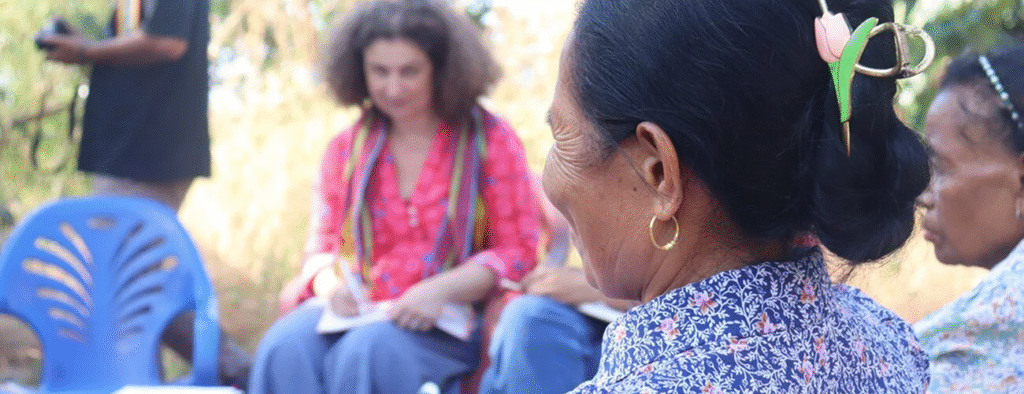It was a seemingly simple act, putting pen to paper in an office in Timor-Leste’s capital Dili. But for dozens of Timorese survivors, it marked a new chapter in their decades-long fight for justice.
This summer, the ‘Pirilampu’ national survivor network was officially registered as a formal association, marking a major milestone for the group of women from across the country. At the ceremony, one woman sat ready to sign the paperwork – and use a pen for the first time in her life.
The tiny island nation is home to survivors of conflict-related sexual violence committed during the Indonesian occupation from 1974 to 1999. The oldest are now in their 70’s. All are still awaiting proper reparations and recognition.
Pirilampu, which means ‘firefly’ in the Tetun language, was established in 2022, when survivors scattered across 13 municipalities were brought together by our partners, Asia Justice and Rights (AJAR) and Asosiasaun Chega! Ba Ita (ACbit) in the coastal city of Liquica. Looking at other organisations, they realised women and children born of sexual violence were often excluded.
“There was a realisation that their stories are not there,” said Mana Isabel, who now serves as the network’s president. “I thought I was alone but after coming together and hearing others’ stories, I realised I am not…there are a lot of survivors out there.”
The network has now grown to 41 members, with at least two representatives from each municipality. It is the country’s first national network for women survivors of conflict-related sexual violence, and represents those from all areas of Timor-Leste, both those participating in our interim reparative measures project and those who do not. While the project helped survivors mobilise and learn about the network, the initiative has been wholly built by and for survivors over the course of the last three years with AJAR’s and ACbit’s support.


A meeting with survivors in Dare, as part of phase 1 debrief of the interim reparative measures project. Timor-Leste, July 2024. Anastacio Madeira

The name ‘Pirilampu’ symbolises the connection they feel when they are together, the strength they draw from bonds with other women that understand their pain, and their hopes for the future.
We thought about fireflies and how they light up in the dark. When we come together, there is so much light.
— Mana Isabel, Pirilampu’s President
Official registration opens the door for funding, donations, and strengthens resolve, the women say.
“The forum is like a bridge for survivors whose voice can’t reach the national level. A lot of survivors ask for justice,” said vice-president Mana Deliana Martins. Mana Isabel says the group is for survivors to “come together, share their stories, and advocate with the government,” to be formally recognised as survivors, including in any reparations law.
Pirilampu’s priorities are women survivors and children born of sexual violence, the latter of whom are particularly overlooked, denied access to education and legal documents. The Centro Nacional Chega (CNC), established to implement the recommendations of the truth commission including on reparation, could do more, they say.
“The CNC focuses on general victims of war. It gave opportunities for scholarships but it is a lot of people they focus on – there are so many victims. This is why Pirilampu is important because we focus on survivors and children born of sexual violence,” added Mana Amaral.
Connecting across Asia
In June, Mana Isabel represented Pirilampu at a survivor’s regional exchange in Bangkok – the first of its kind in Asia. The meeting was inspired by the Global Network of Victims and Survivors to End Wartime Sexual Violence (SEMA). It was a demand from SEMA which led to the establishment of GSF back in 2019.
With the Bangkok meeting taking place just weeks before the network was officially registered, it has been a busy time for Maria. But she knows this is important for survivors back home.
“There are still many survivors out there who are not coming forward…we need to keep doing the work to reach all of the voiceless, and we need to continue doing the work for advocacy because the survivors need us.”
Mana Isabel officially joined SEMA in August 2025.
Time passes, but the physical and mental scars from conflict-related sexual violence do not heal by themselves. As the years go by, survivors in Timor-Leste battle old age and its complications, while also speaking up for their rights.
“Our fight is very difficult, but we need to stay strong and be together so that our voice can reach far. I believe that if we are together, we can win this fight,” said Mana Isabel at the Bangkok gathering.
During the event, she reflected on the meaning of Pirilampu, and what it symbolises.
“It means that, even when it is dark, there is still a light and hope for survivors.”